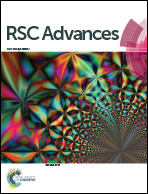Highly sensitive detection of sulfadimidine in water and dairy products by means of an evanescent wave optical biosensor
Abstract
During recent years, there has been an increasing demand for the development of rapid biosensing technologies that could be performed outside the laboratory, for example on farms, near rivers, in food collection stations and store houses or in food production plants. Therefore, cost-effective and automatic detection methods are promising for onsite residual analysis in food and environmental monitoring. In this work, we propose an automatic, rapid, highly sensitive and reusable planar waveguide evanescent wave immunosensor (PWEI) for onsite determination of sulfadimidine (SM2) in water and dairy products. The PWEI is based on an indirect inhibition immunoassay that takes place at an optical transducer chip chemically modified with an analyte derivative. Fluorescence produced by labeled antibodies bound to the transducer is excited by the evanescent wave formed on the transducer surface and detected by photodiodes through a lock-in amplifier, which is inversely correlated with the analyte concentration. Each test cycle is completed automatically in 15 min. The optical transducer chip of the PWEI modified with the analyte derivative is robust and features high reusability, which allows for regeneration over 300 times without sensitivity loss. Under the optimized conditions, the dose–response curve established for SM2 shows a low detection limit of 0.06 μg L−1. The 50% inhibition concentration is 1.39 ± 0.08 μg L−1 with a linear working range from 0.19 μg L−1 to 10.10 μg L−1. The cross-reactivity towards organic compounds structurally similar to SM2 is negligible. The recoveries of SM2 in a variety of dairy products and natural water range from 80% to 107%. The PWEI features portable dimensions of 42 cm × 50 cm × 24 cm (length × width × height) and shows great prospects for the onsite measurement of SM2, when used in combination with the appropriate pretreatment.


 Please wait while we load your content...
Please wait while we load your content...